

News in 2016
|

The Park Royal, Kuala Lumpur – Malaysia was the venue for the FIG, UN-GGIM-AP Working Group 1 Geodetic Reference Frame, and JUPEM forum on Geospatial and GNSS CORS Infrastructure and Systems. The forum was convened on the 16 - 17 October 2016, and comprised of 6 sessions, and 22 presentations. Although this style of workshop was not the first of its type in the Asia Pacific region, it was the first main gathering for the recently formed FIG Asia Pacific Capacity Development Network (AP CDN).
The impetus for this forum originated from discussions with several Asian countries, Leica Geosystems representatives (namely Mr Neil Ashcroft), UN-GGIM-AP Chair Dr. John Dawson and Rob Sarib at the FIG Working Week in Christchurch. Over the next few months the program evolved and the following objectives relevant to geospatial data and GNSS CORS infrastructure themes, such as standards, access to information, institutional arrangements, legal / policy requirements, technology, communications, data, capacity development, people and partnerships, were generated-
The forum host Dr. Azhari bin Mohamed and the national government agency JUPEM (Department of Survey and Mapping, Malaysia) organised an outstanding venue, and provided additional staff to support the logistical components of the forum. All aspects of the venue, hospitality and service were professionally performed and enabled a friendly and participatory environment.
Over 150 delegates from 21 different countries registered for the forum. Over the 2 days, the forum attracted over 100 participants each day and these attendees actively engaged and contributed to the program. To review and access all presentations listed in the following sessions, please navigate to FIG Asia Pacific Capacity Development Network website.

Group photo
Outline: Invited countries provided a brief overview of their status
but more importantly shared insights into how their organisation
overcame their biggest challenge when developing and establishing
geodetic and geospatial infrastructure.
Presenters –
Outline - This session focused on the fundamental purpose and why countries need geospatial and geodetic infrastructure and information; with particular emphasis on how such infrastructure can confront a nation’s economic / political / social / technological challenges.
Presenters –
Outline - This session provided a technical overview on the hierarchal structure of reference frames and the potential benefits for participating agencies. This includes information on GGRF, ITRF, National geodetic datum, and the importance of GNSS CORS.
Presenters –
Outline – Case studies on the implementation of GNSS CORS to modernise geospatial and geodetic infrastructure were presented. This included information on challenges faced with respect to standards, access to information, institutional arrangements, legal / policy requirements, technology, communications, data, people and partnerships.
Presenters –
Outline – In this session presenters provided an overview of their
organisation and how they can support the geospatial and geodetic
infrastructure in the region.
Presenters –
Outline – The purpose of this interactive session was for participants to identify, analyse and prioritise challenges for Region / Countries; explore solutions for the challenges; and discuss and strategize the way forward.
Facilitators – Dr. John Dawson UN-GGIM-AP WG -1 and Mr Robert Sarib FIG AP CDN
Presenter –
As previously mentioned, the forum was conducted in an atmosphere of respectfulness which resulted in open and honest discussions from participants. Many common regional challenges were identified and possible strategies were considered. A summary matrix of these workings was formed and is outlined below.
|
Issue / Challenge |
Specific Problem |
Strategy to Mitigate |
|
Data Sharing Data charging versus “open” / “free” data policy Data infrastructure vs data service delivery |
Sharing of data limited resulting in non-optimum outcomes National legislation /regulation / policy hinders sharing |
Preparation of an pro-forma data agreement to assist with setting up agreements Establishing a forum for discussion, exchange of ideas Encourage participation in common regional / sub regional cause or driver such as APREF Focus the need on broader objectives / perspectives so as to articulate the importance of data sharing Political “will” is an important factor and needs to be addressed and obtained Examine the “parameters” / caveats surrounding data sharing and then discuss Refer to international standards as a means e.g RINEX / SINEX |
|
Technical capability |
Lack of technical expertise is impeding geodetic infrastructure |
Consider using or creating a data centre in the region More workshops on implementation Opportunities to be trained at agencies that have the experience (noting - funding is an issue) Engage better with academic institutions Develop a regional training framework based on “standards”, specifications, guidelines Explore opportunities with private sector to provide training (noting funding is an issue) Raising awareness of geospatial in primary / secondary educational curriculum Develop a mechanism for short term attachments, internships on specific projects / disciplines (noting funding is an issue) Use the network of professional surveyors Use the national requirements for CPD to develop knowledge on geodesy / geospatial |
|
Implementing change (modernisation) |
Lack expertise in developing change programs impeding geodetic infrastructure (communicating change) |
Legislate or mandate geodetic aspects Ensure the technical issues are communicated / implemented before implementation occurs |
|
Resourcing Human + financial |
Lack of expertise impeding implementation of geodetic infrastructure Maintenance of infrastructure and systems Ongoing justification of budgetary support |
Scholarships specific to geodesy / geospatial from donor or development agencies / partners Forums with prospective donor or development agencies /partners to understand their process Advocate / promote the need / value for geodetic / geospatial infrastructure at national / regional / global levels and its importance to society and the economy |
|
Legislation and policy |
Absence of legislation and policies impede implementation of datums Security of data clauses within legislation / regulations Modernisation of legislation (digital info) |
Examine the issues / challenges from a regional perspective Prepare a proposal regarding legal requirements and compliance |
|
Regional unifications |
Lack of data sharing and standards impede unification Duplication of infrastructure and data custodianship Interoperability / integration of data and systems |
More advocacy on standards, and guidelines; the benefits of application and adherence. |
|
Business models |
Roles / Responsibilities of government and private sector changing and is unclear thus leading to indecision and possible duplication and wastage of resources |
Understand the options – share experiences. More inclusion and discussion amongst the various sectors |
|
Communication infrastructure |
Unreliable or lack of communication Impeding geospatial / geodetic infrastructure opportunities Regulations re frequency “spectrum” can be an issue |
Share knowledge experiences to manage this challenge Engage with more telecommunication operators |
|
Academic surveying institutions not providing relevant or quality courses |
Impedes sustainability of infrastructure and operations |
Engage with relevant institutions Consider partnerships / programs with academic institutions More collaboration amongst academic agencies |
|
Decision makers not understanding the importance / value of geospatial / geodetic infrastructure This also applies to the “society” understanding our value. |
Lack of political will and suitable “champions” to advocate the value of geospatial / geodetic infrastructure |
Promote the social, economic benefits / importance (disaster / saving lives) at the national / regional level Articulating the cause and the effect scenarios “Top down and bottom up” approach. Try to get interest / involvement at the Ministerial level – think like them? Innovate ways to get their attention - do not focus just on the technical but alternative social / economic “drivers” Information and awareness campaigns at all levels of government / public / society and make it LOUD. |
|
Attracting more young professionals to surveying |
Succession planning Sustaining the integrity of the infrastructure. |
Have a “geodetic” open day! AtAttend careers workshops. |
The forum concluded with participants recognising that each country in the region is at different phases of development with respect to Geospatial and GNSS CORS infrastructure and systems. It was also acknowledged that despite this the challenges being experienced or resolved by a country are not new or unfamiliar, and that a common and collaborative strategy to overcome these was to share knowledge, information and experiences. As a consequence, FIG AP CDN and UN-GGIM-AP WG1 agreed to facilitate meetings, workshops or forums in 2017 to confront priority challenges and to continue building the capacity of geospatial scientists and surveyors in the region. Presently, the UN-GGIM-AP WG1 work plan for 2017 will comprise of workshops in–
Please note, the FIG AP CDN will also endeavour to be involved in the above capacity building activities, and in conjunction with the UN-GGIM-AP WG 1, continue to provide technical support to the Pacific Geospatial and Surveying Council (PGSC).
In addition, a resolution based on the activities of the subject
forum was compiled by FIG AP CDN and UN-GGIM-AP WG1. This
resolution was then tabled at the Fifth Plenary Meeting of the Regional
Committee UN-GGIM-AP, and was unanimously accepted and endorsed by the
members.
The Geodetic Reference Frame resolution was as follows -
The Meeting,
Reaffirming that the Global Geodetic Reference Frame underpins
satellite positioning technology, provides the framework for all
geospatial activity and is a key enabler of spatial data
interoperability, disaster risk reduction, land management, and supports
sustainable development,
Recognizing the General Assembly Resolution (A/RES/69/266) on the Global Geodetic Reference Frame for Sustainable Development,
Recognizing also the importance of data sharing to enable global and regional products and services to be related to individual countries to support decision makers to address social and environmental issues such as rapid urbanisation, sustainable development, disaster management, and complex crustal dynamics,
Noting the challenges of building technical capacity in the Asia Pacific region to modernise national geospatial and geodetic infrastructure, in particular GNSS CORS densification, geodetic datum determination, unification of height systems, and integration and interoperability of fundamental datasets,
Noting further the challenges of sustaining geospatial and geodetic infrastructure with respect to accessing reliable communications, obtaining and justifying resources, and modernising relevant legislation, policies, and practices particularly in the context of the administering geospatial and geodetic data,
Noting further the lack of awareness of the value and importance of geospatial and geodetic infrastructure amongst some sectors of government, industry and the wider community,
Noting further the present limited availability of qualified young geodetic surveyors in the region,
Recommends that the Regional Committee of United Nations Global Geospatial Information Management for Asia and the Pacific (UN-GGIM-AP):
|
|
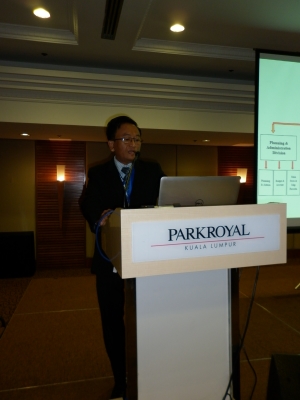 |
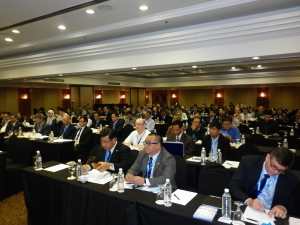 |
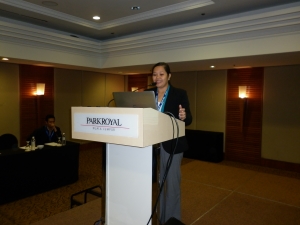 |
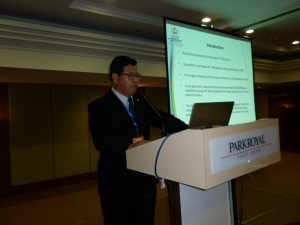 |
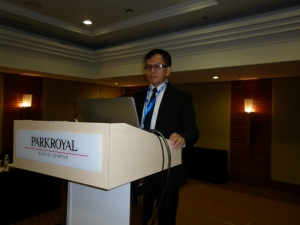 |
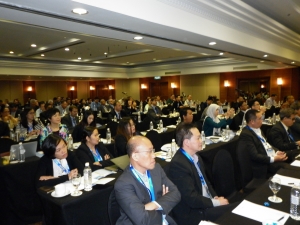 |
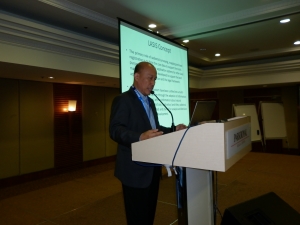 |
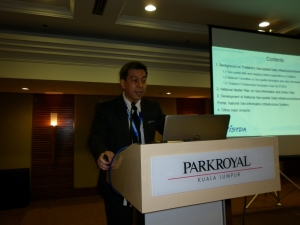 |
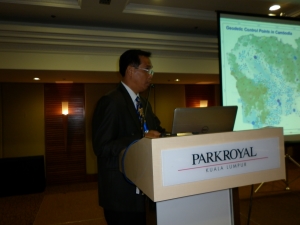 |
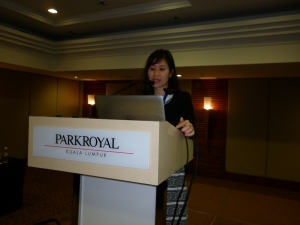 |
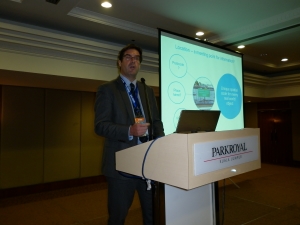 |
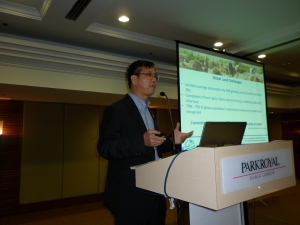 |
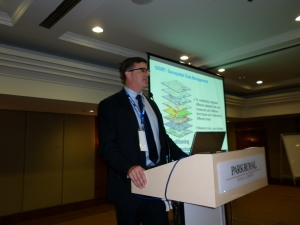 |
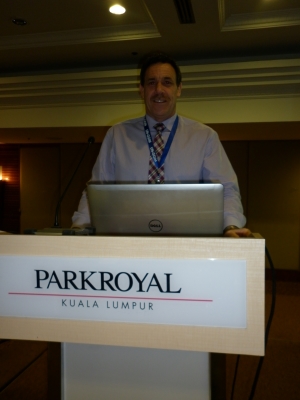 |
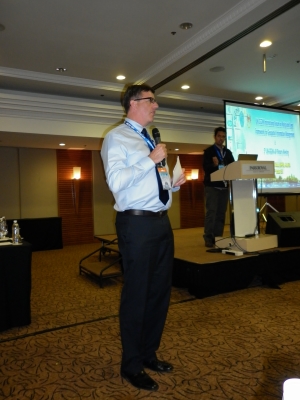 |
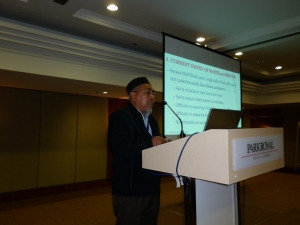 |
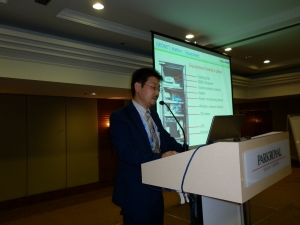 |
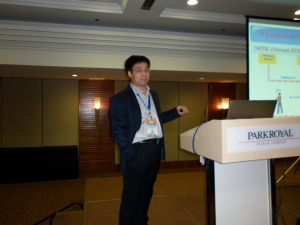 |
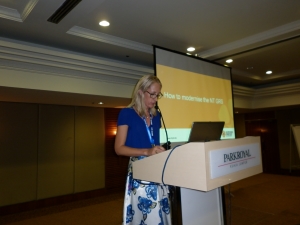 |
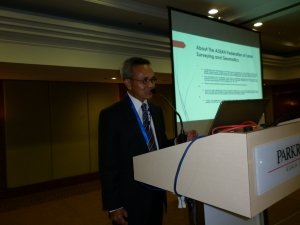 |
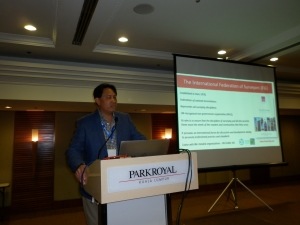 |
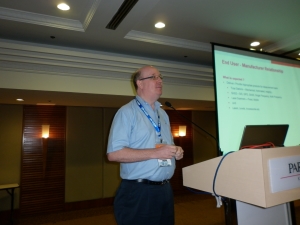 |
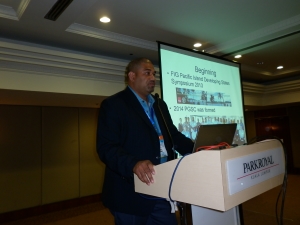 |
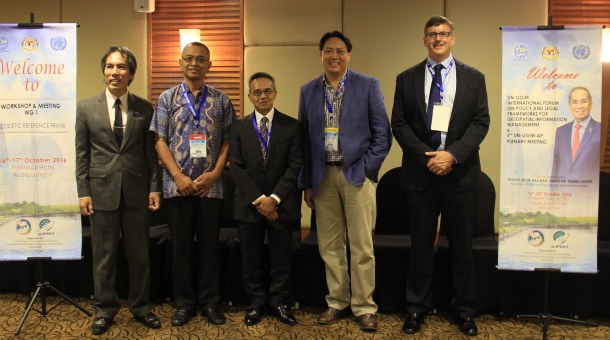 |
|

Upon completion of the Geospatial and GNSS CORS Infrastructure and Systems forum, the 5th UN GGIM AP Plenary Meeting, and the forum on Policy and Legal Frameworks for Geospatial Information Management were convened at the same venue, the Park Royal, Kuala Lumpur. In addition, two other events ran in parallel and they were the Social Tenure Domain Model (STDM) and Fit-For-Purpose workshop, and the 4th Divisional Meeting of the United Nations Group of Experts on Geographical Names (UNGEGN) - Asia South East (ASE). Altogether, these events over the period 17 – 20 October attracted 495 delegates from 29 countries and consisted of 125 international attendees.
To view the proceedings please refer to the web location and select the appropriate presentation materials - http://ggim.un.org/Kuala%20Lumpur%20Forum.html
Like most UN-GGIM-AP events opportunity was provided to participants to discuss and question the presentations and their findings. As a result a “declaration” relating to policy and legal frameworks for geospatial information, and several “resolutions” from UN GGIM AP working groups were subsequently prepared, tabled and endorsed at the UN GGIM AP Plenary Meeting. Please refer to the following web location http://ggim.un.org/Kuala%20Lumpur%20Forum.html for the link to the Kuala Lumpur Declaration and to web location http://www.un-ggim-ap.org/ for the various UN-GGIM-AP Working Group Resolutions.
 |
 |
The key messages to note from the UN-GGIM-AP Plenary and Policy and Legal Frameworks forum sessions were–
Once again, special thanks to JUPEM (Department of Survey and Mapping, Malaysia) for sponsoring the UN-GGIM-AP events and also being great hosts for the entire week in Kuala Lumpur.
In concluding, with the rapid advent of urbanisation, the uptake of disruptive technologies and the apparent increased frequency of natural disasters in the Asia Pacific region, FIGs role in developing the geospatial capacity to address these challenges will be important. Although, it was evident that there is an appetite and willingness amongst individuals and agencies to make an immediate impact, it was generally agreed that more work is still required to obtain the “political will” from the decision makers so as to achieve more affirmative action.
Rob Sarib, Chair of Asia/Pacific FIG Capacity Development Network
25
October 2016